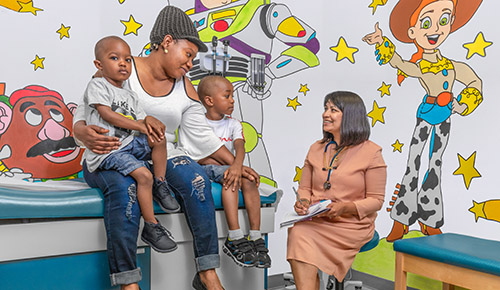
Johanson (left), his mother Hopanda and brother Johannis attend an appointment with pediatrician Bonnieca Islam, an associate teaching clinical professor in the Department of Pediatrics.
There is an ordinary red-brick building in northeast Edmonton where pediatricians are doing extraordinary things for their young patients. The pediatric clinic is a place where disadvantaged Northeast Community Health Centre's children and youth are seen by physicians who take a 360-degree view of their health to consider the social and economic challenges facing their families.
Physicians take a holistic approach to care and help students and residents understand the social determinants of health.
"If you compare the demographics we see versus all of Edmonton, we have a higher number of new Canadians, families that don't have English as their first language, a higher proportion of families living in postal codes with lower household incomes, and families with more children," says Bonnieca Islam, a physician at the clinic and an associate teaching clinical professor. Many families coming to the clinic are refugees, as well.
Islam explains that factors like poverty, language barriers, and previous trauma can all play a role in the child's overall health and, if not addressed, may hinder treatment. "It's not like you're just dealing with a child's asthma," she says. "You're dealing with a child whose family doesn't have money for medications or food."
The clinic's physicians-most of whom are also academic staff with the department-bring up-to-date knowledge of the social determinants of health to the table. Because patient needs can be complex, they use every resource at their disposal to overcome barriers to wellness-from the Alberta Health Services' language service to help translate during patient encounters to the health centre's emergency department to address urgent needs.
Staff also conduct outreach clinics in outlying areas so that families are seen in their home communities. The clinic is the only general pediatrics clinic in Edmonton to use Telehealth services to arrange appointments with even more communities, negating the need for families to travel.
Recently, the clinic became a part of the Pediatrics Kids in Care (PKIC) program, which allows them to consider additional information about the many children in government care that they see. PKIC gives physicians a more complete picture of children's medical, past and family histories. By liaising with caseworkers, foster parents, and biological parents (when possible), the clinic learns more about the child's journey and how the past events in their life may be affecting their well-being now. "It's a more complete approach because knowing more about a child's past experiences allows us to provide trauma-informed care," says Islam.
There is also the recent addition of a part-time social worker at the clinic to help families connect with supports like housing and food banks. Even so, Islam and her colleagues often feel the need to advocate for patient families in the community. She recently wrote a letter to a family's property owner asking them to deal with a cockroach problem that was likely exacerbating their son's asthma. "We're not politicians, we're pediatricians, but we try to do the best we can for families," she says.
Many of the physicians are also becoming more involved in community-based research in the hope that outcomes can be shared with other stakeholders. On top of their advocacy work, the clinic is teaching the next generation of physicians how to be culturally aware and sensitive, which Islam feels is a crucial part of practicing medicine. Fortunately, it seems to be an attitude residents share. "I definitely think there's a new generation of physicians who are genuinely concerned with serving this population and the importance of being culturally sensitive," she says.